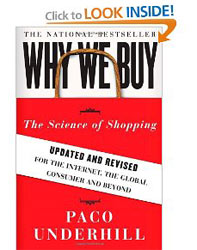 So why do we buy? Imagine this: you’ve just entered your favorite store. The aisles are wide so you don’t feel rushed, the merchandise is highly visible and comfortable to reach even with a bad back, and the words practically jump out at you, so easy to read! So pleased are you with the layout of the store, the inviting atmosphere, the signage, music, and lighting, that you decide to keep shopping, even though you have already found what you came for.
So why do we buy? Imagine this: you’ve just entered your favorite store. The aisles are wide so you don’t feel rushed, the merchandise is highly visible and comfortable to reach even with a bad back, and the words practically jump out at you, so easy to read! So pleased are you with the layout of the store, the inviting atmosphere, the signage, music, and lighting, that you decide to keep shopping, even though you have already found what you came for.
You enter a sort of shoppers’ reverie. And the checkout line? Smooth like butter, and what’s that overhead? A banner displaying the new merchandise that will be arriving next week―you’ll have to remember that.
And then a manager comes out and with a friendly smile asks if you were able to find everything you were looking for and tells you a funny little story. With an appreciative laugh, you reach out for one last impulse purchase.
When it’s your turn to pay, you’re surprised at first to have spent so much-what got into you? No matter, you hand over your credit card, and are promptly offered help out with your bags.
Do you leave feeling like a deal hound, proud of your shopper savvy, already planning your next visit…or do you feel a little manipulated, spent, and suddenly uncertain that maybe you didn’t need all that after all, and now you’re going to have to go home and put it all away…if you can find the room?
What Message Should We Take Away from Why We Buy?
While Why We Buy: The Science of Shopping contains some practical advice about aging eyesight and how to make it easier for businesses to cater to the whimsies of particular demographics, it hints at, but does not adequately explain the psychological forces at work on a person.
Nor does Why we Buy examine the roots behind our evolutionary drive to hunt, gather, and be on the lookout for opportunistic encounters. Perhaps a follow-up could to be written from the shoppers’ point of view:
Should We Buy?
We are privileged to live in a time in which humans are at the top-of-the food chain, but as our numbers swell, we have a shrinking base of wildlife and other natural resources to support us. Imagine what we might learn if our consumer impacts were measured with the same care and precision that has been used to observe shopper behavior for the benefit of the marketer?
For me, the striking but unintended message of this book was how competitive and sly distributors of resources needed to be for their own financial bottom line. This seems to force businesses to compete in a race to the bottom – obtaining resources for the lowest price, while paying the least for labor and externalizing as many real costs, such as environmental impacts, as possible, all while measuring profits in the margins of clever marketing and store appeal.
Blogs like Earth Friendly Goodies have helped me sift through the hype while educating and informing me about healthier products. Purchasing an eco-friendly mattress after considering the environmental impact is one thing, being forced by psychological factors to buy more than we need is another. While I think Why We Buy can be a good preliminary glimpse into the world of buying, it is by no means the final word.

 Earth Friendly Goodies If it's Good for the Earth it's Good for Your Health
Earth Friendly Goodies If it's Good for the Earth it's Good for Your Health
Great post. Thanks for letting me stopped by, and read your post. I am looking forward for more interesting post.
Great post! I really want to add here that I feel this trend is more noticeable in women! My dad goes shopping and brings everything we NEED, when I go or my mom, we buy everything we WANT! A very important difference we really need to understand!
It’s smart marketing tagline. so educated and inspired
Its a smart and inspiring kind of marketing tag line…
This seems like a very interesting book for anybody.
I will try to look for more review about this …
I am always interested in these types of books so I might have to add this to my ‘must read’ list! 🙂
This sure looks like another interesting read 🙂 I consider myself too impulsive for my own good and I think that it would definitely be necessary for me to understand my spending habits and priorities. Thanks! Happy Holidays!
I have no idea why but I find it hard to come out of the grocery with just the bare necessities. I always come out with an item or two more than what I actually need. This is great; thank you for sharing it with us.
Nice blog! I totally agree that we should focus more on what we need in order to survive than what we want to make surviving a nice experience. Well, because at the end of the day, the surviving part is what matters most. And surviving can only be possible if we focus on what we need. Thanks for sharing your blog! 🙂